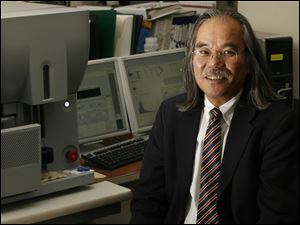
UT wins stimulus grants; researcher paving way to halt use of lab animals
10/20/2009
Dr. Akira Takashima has received a $1 million grant to test his theory and another $1.4 million for staffing and other research.
A University of Toledo professor is researching a way to create a three-dimensional skin replica that could eliminate the need to use lab animals for testing chemicals.
Dr. Akira Takashima, chairman of medical microbiology and immunology at the University of Toledo's medical school, the former Medical College of Ohio, just received a competitive $1 million grant from the National Institutes of Health to test his theory.
It's part of a total of $2.4 million he recently brought in from stimulus dollars for research.
"Most of the toxicology research and testing has been conducted in mice or rabbits, in animals," he said. "In Europe you can no longer test on animals, and more and more it's headed that way. So, how can we test new chemicals?"
There are so many components to cosmetics, lotions, soaps, ointments, and more that touch human skin and have to be safe to do so, Dr. Takashima said.
Contact dermatitis is one of the most common health problems, said Dr. Takashima, who has a background in dermatology.
His idea for a three-dimensional, multicellular skin model would be easily and inexpensively created, allowing thousands of chemicals to be tested a day, Dr. Takashima said.
The skin in most areas is the thickness of about 20 sheets of paper, with each layer comprised of layers of cells, he explained.
The skin replica would use the keratinocytes, langerhans cells, and fibroblast cells in a collagen matrix. The researchers would then engineer it to sense stress from allergens and toxins and a fluorescent signal would appear when that happens. Those signals would be a sign that the chemical would agitate human skin.
"The industry has to move out from animals, and this is a way to do it," Dr. Takashima said.
The $1 million National Institutes of Health grant will support the research for two years.
He also received a $1.25 million grant to recruit and hire junior faculty and a $150,000 supplemental grant to continue research on langerhans cells, which are the skin's immune cells, both also from the National Institutes of Health through stimulus funds.
The money to hire talented faculty is an asset, Dr. Takashima said, because recruitment has been frozen at many higher education institutions with the state of the economy.
"It's obviously very prestigious for the university and University of Toledo Medical Center and for the world-class researchers such as Dr. Takashima who are receiving these grants," said Dr. Jeffrey Gold, UT's provost and executive vice president for health affairs and dean of the medical college.
UT is heavily invested in bioscience research, Dr. Gold said, primarily the fields of cardiac and vascular diseases, cancer, neurological and degenerative diseases, infection and immunology, and movement disorders.
The National Institutes of Health received $10.4 billion in stimulus money to distribute, and the proposals for funding were highly competitive.
Altogether Dr. Takashima's $2.4 million in research makes up a considerable amount of the total $9.1 million UT has received in stimulus money. The university submitted a total of 119 proposals, and 24 of those were funded.
Dr. Gold said stimulus investment in medical research accomplishes many of the goals it was set to do. "It is an excellent use of stimulus dollars because it is totally shovel-ready because the work force to do this research is in place, and it's just flick a switch and they are working and doing this research," he said.
There also are the possibilities of new spin-off companies and intellectual property, Dr. Gold said.
"It has dramatic direct and immediate stimulation of the economy far beyond what you get by employing more people," he said.
Dr. Takashima's department will host a science and technology expo on Friday to show more of what is being done in the field.
Businesses were invited to bring their state-of-the-art equipment to display for students and the public in the Dana Conference Center on UT's health science campus. The event is from 9 a.m. to 5 p.m. On Saturday, UT will host its annual workshop on infection and immunity in which leading experts will discuss their research, also in the Dana Conference Center. Registration is required.
Contact Meghan Gilbert-Cunningham
at: mcunningham@theblade.com
or 419-724-6134.